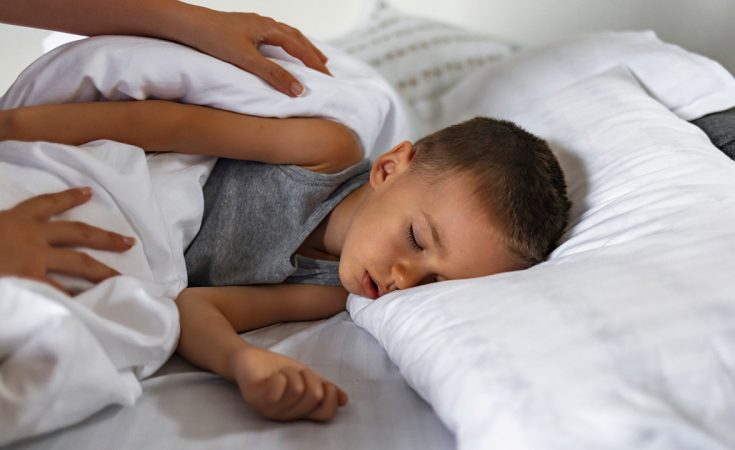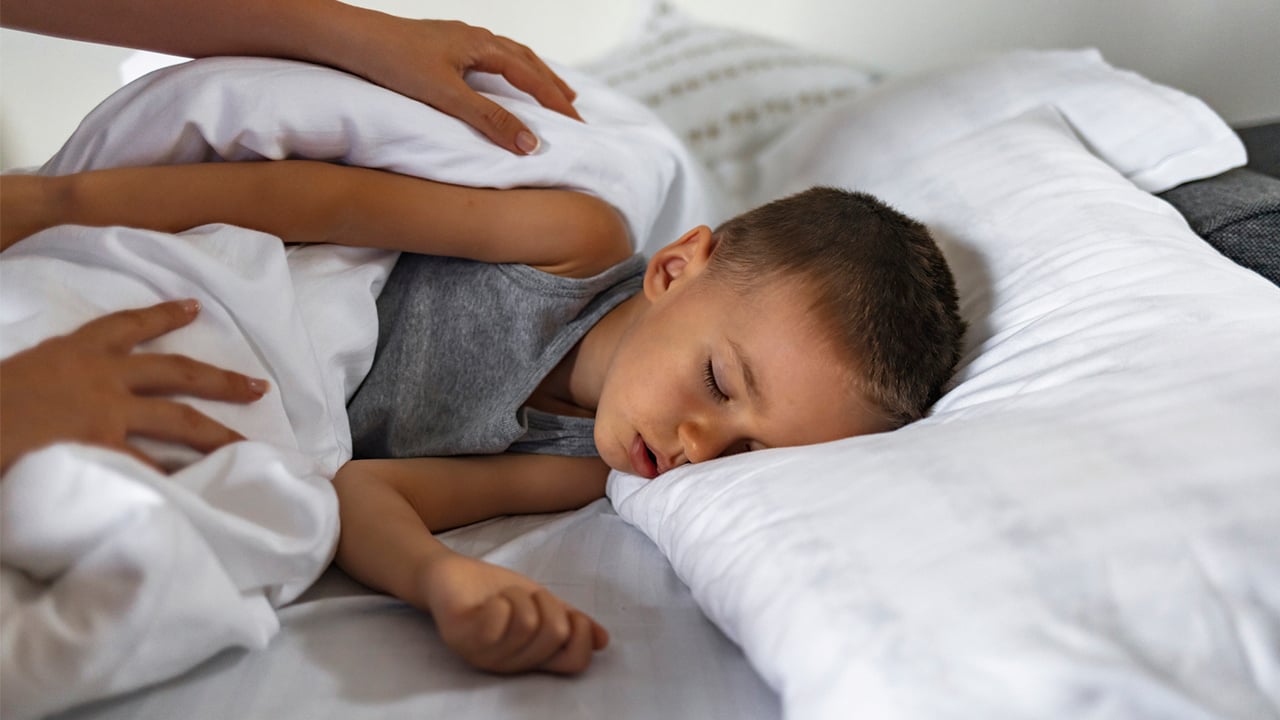When now 13 year-old Manuel Firkus first got sick with COVID-19 in March of 2020, his only symptoms were constant burping and about three days of diarrhea. In fact, his family, who lived in B.C. at the time, would have thought nothing of his brief illness if it weren’t for his sister’s high fever and cough, his mom’s horrible wet cough and the fact that the World Health Organization had just called COVID-19 a global pandemic.
His mom, Jaymie’s, symptoms persisted—she was unable to return to work due to fatigue, a racing heart, low blood pressure, brain fog, loss of taste and smell and a host of other symptoms that terrified her. But Manuel’s symptoms went away completely—until a sunny day in May, when he suddenly collapsed while mowing the lawn. “His legs were too weak and we had to carry him into the house,” recalls his mother, who now lives in Alberta. That night he experienced chest pain and strange heat sensations throughout his chest and torso, which he described as his insides “sparking up” with the heat. His mom says that over the next week he started vomiting, got severe headaches and dizziness and his toes turned purple and sore. They took him to the hospital but didn’t get any answers. “There was a lot of confusion and different opinions about what was occurring,” recalls Jaymie. No one in the family had been tested for COVID-19—at the time of their first symptoms, testing was sparse and Manuel wouldn’t have qualified anyway—but they were working under the assumption it had gone through their family. Doctors agreed COVID could have been at the root of Manuel’s symptoms but said there was nothing they could do. He was sent home to recover on his own.
When COVID-19 first started circling the globe, parents were reassured by reports that kids mainly get mild cases of the disease—a fact that remains true, although we now know some do have more severe illness. What’s also become clear, however, is that a small subset of kids will go on to suffer debilitating symptoms that can last for months. According to Danilo Buonsenso, a paediatrician at the Gemelli University Hospital in Rome, who has published several papers on long COVID in children, one to four percent of kids who get COVID could have symptoms that last longer than six months. Susie Goulding, the director of the support group Long Covid Kids Canada, says more than 200 families across Canada have reached out to her group for support since the pandemic began, and the number is growing. While the overall risk of a child getting long COVID still appears low, experts say more awareness of the condition is needed so those suffering can get the help they need.
Symptoms of long COVID in kids
So far, it seems that most children who develop long COVID have initial infections, like Manuel, that are mild. According to two studies published by Buonsenso, over 95 percent of children who have persisting symptoms were not hospitalized. About three quarters of those initially infected had mild to moderate symptoms like fever, sore throat, cough or shortness of breath that could be managed at home and, depending on the study, twelve to twenty-five percent were asymptomatic. Although we don’t have a lot of data in Canada so far, these trends appear consistent here. According to Thanh Diem Nguyen, a paediatric respirologist at the Post-COVID-19 Clinic at Ste Justine hospital in Montreal, all of the children seen so far at the clinic had mild initial infections. Of the 22 children that attend the clinic, most had flu-like symptoms like a wet cough, headaches, shortness of breath or fever.
Some long-haul kids continue to have symptoms from the time they first get infected. Other kids seem to get better but within several weeks a wide range of physical or neurological symptoms set in. According to information reported by members of Long Covid Kids Canada, the symptoms among Canadian children run the gamut from fatigue, headache, sore throat, diarrhea, reflux, nausea and vomiting, joint and muscle pain, brain fog or dizziness, rashes, mood changes and chest pain. Other symptoms reported include fevers, shortness of breath, feeling illness or discomfort after exertion, weight loss, abnormal heartbeats, seizures, hair loss, testicular pain, phantom bruising, hallucinations, intracranial hypertension, bladder inflammation, temperature dysregulation, sore or bleeding gums, mouth blisters or canker sores, and changes in vision. “The symptoms can ebb and flow in what seems like a never-ending cycle,” says Goulding, who has spoken with many of the families. “Old symptoms may come back, and you never know what symptoms you may have on any given day. Some children can even experience 40 to 50 symptoms.”
Kids at the Post-COVID-19 clinic in Montreal have many of these same symptoms, but the most common one there is fatigue. Other symptoms like dizziness and heart palpitations are common enough that one designated cardiologist and one ENT (ear-nose-throat) specialist are available for fast-track consultations. Less common symptoms seen there have been memory retention problems, loss of smell, or not being able to smell properly.
Does long COVID go away?
The good news is, most kids recover from long COVID within three to five months, says Buonsenso. However, some continue to experience symptoms for much longer. Nguyen has treated children with symptoms lasting 18 months but this isn’t common.
Although it’s unknown whether those with persisting symptoms will eventually get better, both Buonsenso and Nguyen are cautiously optimistic. Buonsenso believes that large public interest in COVID will lead to more research and a better understanding of long COVID, including treatments. He also says that preliminary evidence suggests that inflammation or viral persistence could be causing lingering symptoms in most children. Kids’ progress in the Montreal clinic seems to confirm that permanent lung damage is unlikely. “So far our tests show that all of our patients have normal lung function, even though they have a decreased capacity for exercise. We’re not sure why just yet,” says Nguyen. “Most of the kids are getting better with time, but it’s much slower than with the flu or other viruses. However, even though they’re getting better, they’re still not reaching their condition before COVID. I believe that it will eventually go away, but it’s hard to tell. It may take several months to years.”
There isn’t enough data yet to know whether vaccination may improve long COVID symptoms in kids, or if it may help prevent them from getting long COVID if they become infected, although Buonsenso says it’s reasonable to believe that vaccinated kids will have a very low risk of long COVID.
Who’s at risk for long COVID?
The biggest risk factor in developing long COVID is probably age. According to Buonsenso, adolescents are at a higher risk than younger children, and the Post-COVID-19 clinic in Montreal has mostly seen kids 12 years old and older. However, any child can be affected. “We have an even mix across all ages,” says Goulding, of the long COVID kids support group. “The youngest is only 13 months old.”
It’s less clear whether other factors can increase the risk of a child developing long COVID. In the Montreal clinic, 64 percent of the patients are girls, but there are no other clear risk factors. One UK study found that asthma, eczema and allergies were the most common pre-existing conditions. However, most of the kids in published studies, the clinic, and the Long Covid Kids Canada group were healthy, active and had no known risks before getting long Covid.
What’s the impact of long COVID on kids?
While so far, it appears that the statistical chance of your child getting long COVID is low, if your kid does get long COVID, it can have a big impact on their lives. A few of Nguyen’s patients are failing their classes because of memory retention problems. Others can’t do physical education and need to be removed from the class. According to Goulding, members of the Long Covid Kids Canada group are reporting similar problems. Some of the kids are having trouble paying attention or concentrating in class while others need to take virtual classes and take five-hour naps during the day. “Some children are bedridden and can’t attend school at all. Grades definitely slip and so does mental health,” she says. “Kids have to stay in while their friends are out playing outside. They can’t participate and do the things that they could before.”
Getting support for long COVID can be difficult. “It can be hard to find providers in small communities outside of big cities, and provinces with low caseloads may not have knowledgeable providers,” says Goulding, speaking of several group members’ experiences. “Long Covid is so new and the issues these children are having often don’t show up on any diagnostic imaging. The families are often not believed.” Also, many symptoms can easily be attributed to something else. “Most (kids) are told that this is psychological and no investigations are offered nor treatment,” says Buonsenso. One 15-year-old girl in the Long Covid Kids Canada group who suffered from phantom bruising experienced this firsthand. She went to three different medical professionals, who all said that she was self-harming.
For Manuel, the fatigue, chest pains, and dizziness occurred on and off for about six months. “It was a frightening and lonely time,” recalls his mother, who eventually got antibody testing for her family that indeed showed they had been previously infected with COVID. “There were frequent naps, almost like when the kids were toddlers.” Manuel’s symptoms got worse after running around and he couldn’t attend school for a while. After about six months, his symptoms finally started to subside—although mom’s are ongoing. “He does seem to be better now,” says Jaymie, noting that it took until March 2021 for his purple toes to clear up. “This year will be his first time back at school since getting ill. He hasn’t quite gotten back to team sports, but hopefully will soon.” Though he has improved physically, his experience with long Covid has left an emotional toll. “He still doesn’t want to go into stores or visit with a lot of people. He’s scared to get the virus again and bring it into the home.”
What should families do to protect their kids?
Though long Covid is concerning, there’s no need to panic, says Buonsenso. “Parents should not be worried since most kids recover, but should try their best to minimize risk of contracting COVID through vaccinations, hand washing and masks.” Still, it’s important to be aware of. “People only see the accessible data like hospitalizations,” says Nguyen. “They are less aware of the impact of long COVID.”
With files from Emily Latimer



































